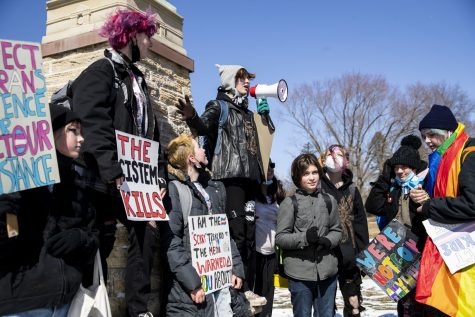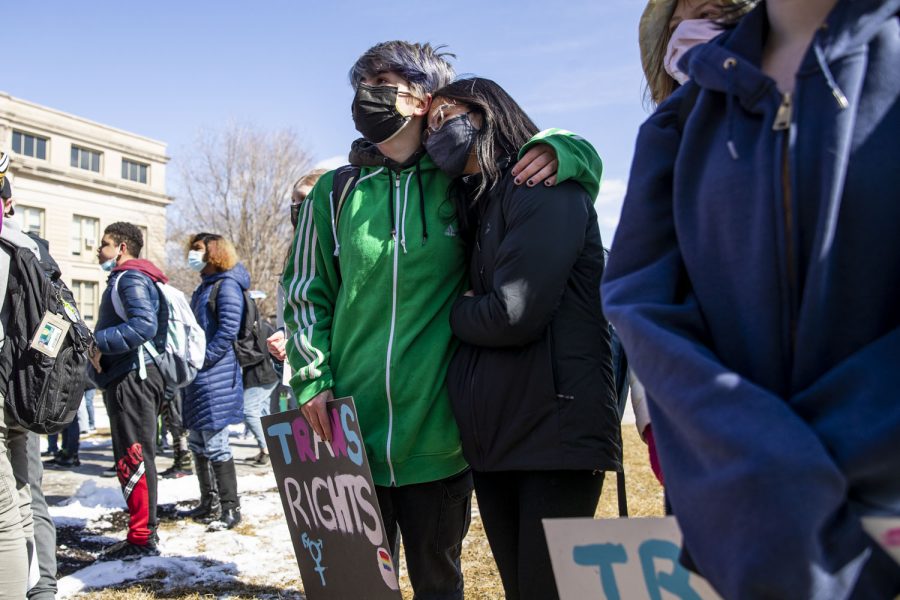Iowa City students hold demonstration for trans rights
Friday afternoon, over 150 Iowa City students walked the streets of Iowa City in below freezing weather to condemn HF 2416, which prohibits transgender students from playing school-sanctioned sports.
Attendees listen to a speaker during a transgender rights protest at the Pentacrest on Friday, March 11, 2022. The protest started at South East Junior High School, went to Iowa City High School, and ended on the Pentacrest.
March 11, 2022
Iowa City junior and high school students took to the streets Friday afternoon in a demonstration protesting a new Iowa law that bans transgender girls and women from playing on the sports teams that correspond with their gender.
Ace Drumbarger, a seventh grader at South East Junior High School, was one of the coordinators of the demonstration. He helped to lead the group of over 150 students from the junior high campus to the Iowa City High School campus, and then to the Pentacrest in a walk-out and march in support of LGBTQ+ rights.
“Let us live our true lives, let’s go past the boundaries of society and let us push against the misogynistic people telling us how to live our lives,” Drumbarger said.
HF 2416 prohibits transgender girls and women from playing on school-sanctioned girls’ and women’s sports teams and applies to K-12 and college sports. The law was signed by Gov. Kim Reynolds on March 3.

“This is a victory for girls’ sports in Iowa. No amount of talent, training or effort can make up for the natural physical advantages males have over females. It’s simply a reality of human biology,” Reynolds said in a press release when the law was signed. “Forcing females to compete against males is the opposite of inclusivity and it’s absolutely unfair.”
Drumbarger said the law is dangerous for transgender students across the state. He listed statistics about LGBTQ+ mental health across the nation and how a law like this one will negatively affect suicide and depression rates.
Being rejected by your family and community increases risk of suicide, Drumbarger said. The fact that this law does not validate transgender women and girls as women, he said, makes it more likely that their schools will also invalidate them.
In one study, transgender youth experienced a 60 percent reduction in depression symptoms and a 73 percent reduction in suicidality when provided access to gender-affirming care.
V Fixmer-Oraiz, a candidate for Johnson County’s Board of Supervisors, spoke at the demonstration about their own experience coming out as queer back in the ‘90s. They played basketball in high school and college and said they remember not having to worry about being able to play or not.
“I remember lying awake at night wishing I had a different body. I didn’t have the language for it then, but I am so inspired by the young people who have shown us that they know who they are,” Fixmer-Oraiz said.
Fixmer-Oraiz said that the law is dangerous for transgender students because they will continue to experience discrimination and won’t have the comfort of their sport’s teams like others do.
“You deserve better. We deserve better. Our community deserves better,” Fixmer-Oraiz said.
Tina Kapp, an Iowa City resident who brought her daughter-in-law and granddaughter with her to the demonstration today, said she attended because she wanted the opportunity to fight for transgender individuals to play because they shouldn’t be treated differently.
Kapp is shocked by the law because she said there’s no reason to think that a transgender woman is not a woman.
“Transgender people are some of the bravest people in the world and for them to have a right taken away from them is just incomparable,” Kapp said.
Zee Lauer, a South East Junior High eighth grader, said that they believe playing sports is good for mental health and is also a healthy way to channel anger and any negative emotions that transgender individuals are feeling.
Lauer said sports teams create a tight community that cares for each other and taking this away, they said, will remove an important resource for certain students.
“Trans individuals in general have a higher risk of bad mental health so participating in sports is really good for them,” Lauer said.
Lance Grulke-Mangrich, a City High freshman, said that HF2416 does not help to make women’s sports more fair, but is used to attack oppressed people. They said that transgender atheletes are not playing in order to have a competitive advantage but just to play a sport that they love with their peers.
“What you’re doing is you’re hurting people who have struggled their entire lives and haven’t done anything to harm anybody else,” Grulke-Mangrich said.



